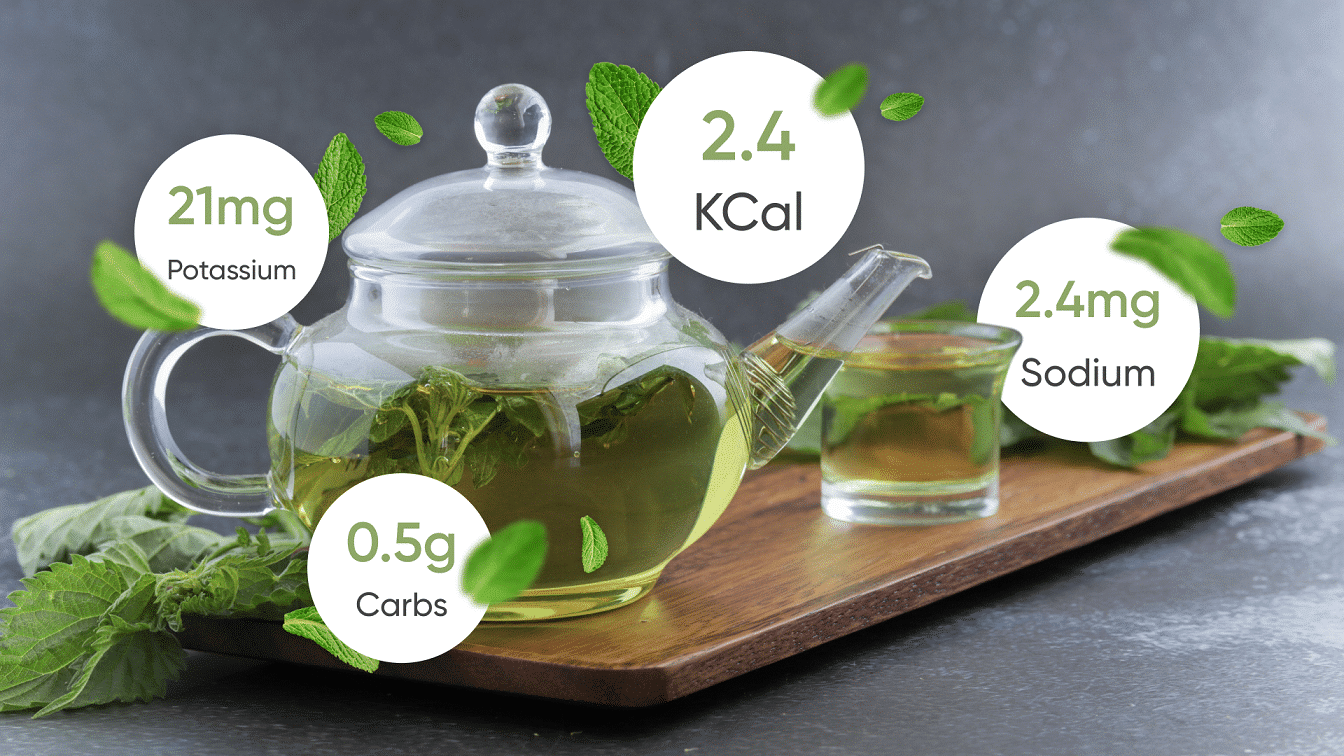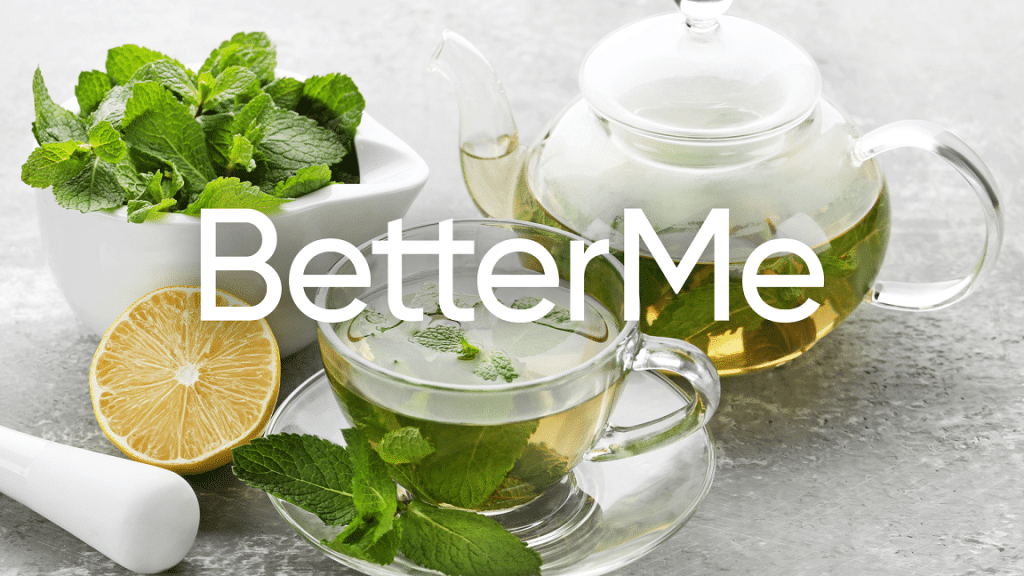Peppermint tea is a popular herbal drink that has been used in traditional Chinese medicine for centuries. It is most often consumed as an iced tea but can also be enjoyed hot, or you can also combine it with other ingredients to create flavorful beverages. The soothing flavor of peppermint makes it the perfect drink to soothe frazzled nerves and enjoy during any time of day. Peppermint has many potential health benefits, which we’ll review in this article. It also has a few side effects worth noting. Below, we will tackle the things you need to know.
Get your personalized
meal plan!
Peppermint Tea Health Benefits
Peppermint tea is often consumed for its flavor, but it also is also believed to have several health benefits. The tea itself has rarely been studied scientifically, but peppermint extracts have.
Here are the science-backed benefits of this plant:
Eases Stomach Upsets
Peppermint oil is sometimes used to soothe gastrointestinal symptoms like stomach cramps, bloating and flatulence. It works by helping to relax the smooth muscle of the bowel wall. It is not clear whether drinking peppermint tea would have the same effect, but some people do find that it helps with stomach upsets.
Might Protect Against Cancer
The antioxidants in peppermint tea have been shown to have anti-tumor activity in a test tube.s (2).
Boosts Mood And Cognitive Performance
Peppermint aroma has been shown to enhance memory and increase alertness (13).
Improves Symptoms Of Dysmenorrhea
Peppermint has been used as a home remedy for menstrual cramps. One study found that peppermint extract helped to reduce period pain and other symptoms (9).
Read More: Ginger Cinnamon Tea Facts, Health Benefits And Side Effects
Boosts Exercise Performance
One study found that consuming peppermint essential oil helped improve exercise performance, possibly by improving breathing and/or reducing pain (16).
Relieves Tension Headaches
One preliminary study showed that applying peppermint oil on the forehead and temples helped relieve tension headaches (14).
May Stimulate Hair Growth
One study in mice found that 3% peppermint oil could promote hair growth when applied topically, possibly by increasing blood flow to hair follicles (15). If you do decide to try this, always dilute your peppermint oil into a neutral carrier oil and do a patch test first. Never apply to broken or inflamed skin.
Freshens Breath
Peppermint is a good choice for freshening breath. This is because it contains menthol which has antiseptic and antibacterial properties that can kill germs in the mouth and reduce bad breath (7).
May Soothe Pain And Muscle Soreness
Peppermint oil is a common topical remedy for sprains and sore muscles, as it provides a cooling effect and may reduce pain and relax the muscles.
If you wish to cinch your waist, tone up your bat wings, blast away the muffin top – our fitness app was created to cater to all your needs! BetterMe won’t give excess weight a chance!
Peppermint Tea Side Effects
As with all herbs, peppermint tea can cause side effects in some people. People who have gastroesophageal reflux disease (GERD) and esophageal spasms should avoid using peppermint tea or at least consult a doctor before doing so (12).
Peppermint may interact with medications that are processed by the same enzyme pathways as the liver. Side effects include nausea, vomiting, stomach pain, diarrhea, dizziness, restlessness, and irritability. So, again, drink peppermint tea only under a doctor’s supervision to avoid potential side effects (12).
If you’re allergic to menthols or menthol-producing plants, like mint, corn mint, and birch, it’s best to avoid peppermint tea.
Peppermint oil is also not recommended during pregnancy without first talking to your doctor because it has not been well-studied (12).
The Bottom Line
Peppermint tea is a tasty herbal remedy with potential health benefits. However, peppermint tea benefits are limited to minor health problems and do not work as a miracle weight loss solution. Peppermint should be used as a medicine only under a doctor’s supervision, especially if you are taking other medications. If you are pregnant, talk to your doctor.
DISCLAIMER:
This article is intended for general informational purposes only and does not address individual circumstances. It is not a substitute for professional advice or help and should not be relied on to make decisions of any kind. Any action you take upon the information presented in this article is strictly at your own risk and responsibility!
SOURCES:
- Anti-osteoarthritis potential of peppermint and rosemary essential oils in a nanoemulsion form: behavioral, biochemical, and histopathological evidence (2021, biomedcentral.com)
- A review of the bioactivity and potential health benefits of peppermint tea (Mentha piperita L.) (2006, wiley.com)
- Blood Sugar & Stress (n.d., ucsf.edu)
- Comparing the Effect of Aromatherapy with Peppermint and Lavender Essential Oils on Fatigue of Cardiac Patients: A Randomized Controlled Trial (2021, hindawi.com)
- Comparing the effect of aromatherapy with peppermint and lavender on the sleep quality of cardiac patients: a randomized controlled trial (2020, biomedcentral.com)
- Effect Of Peppermint Essence On The Pain And Anxiety Caused By Intravenous Catheterization In Cardiac Patients: A Randomized Controlled Trial (2019, nih.gov)
- Essential oils, their therapeutic properties, and implication in dentistry: A review (2015, nih.gov)
- Essential oils and Their Vapours as Potential Antibacterial Agents against Respiratory Tract Pathogens (2016, pubmed.gov)
- Evaluation of mint efficacy regarding dysmenorrhea in comparison with mefenamic acid: A double blinded randomized crossover study (2016, nih.gov)
- Herbal Medicines for Gastrointestinal Disorders (2017, pubmed.gov)
- Interventions for treating persistent and intractable hiccups in adults (2013, nih.gov)
- Is Peppermint Tea Good for You? Pros and Cons, Nutrition Information, and More (2020, webmd.com)
- Modulation of cognitive performance and mood by aromas of peppermint and ylang-ylang (2008, pubmed.gov)
- Peppermint oil in the acute treatment of tension-type headache (2016, springer.com)
- Peppermint Oil Promotes Hair Growth Without Toxic Signs (2014, nih.gov)
- The effects of peppermint on exercise performance (2013, nih.gov)












